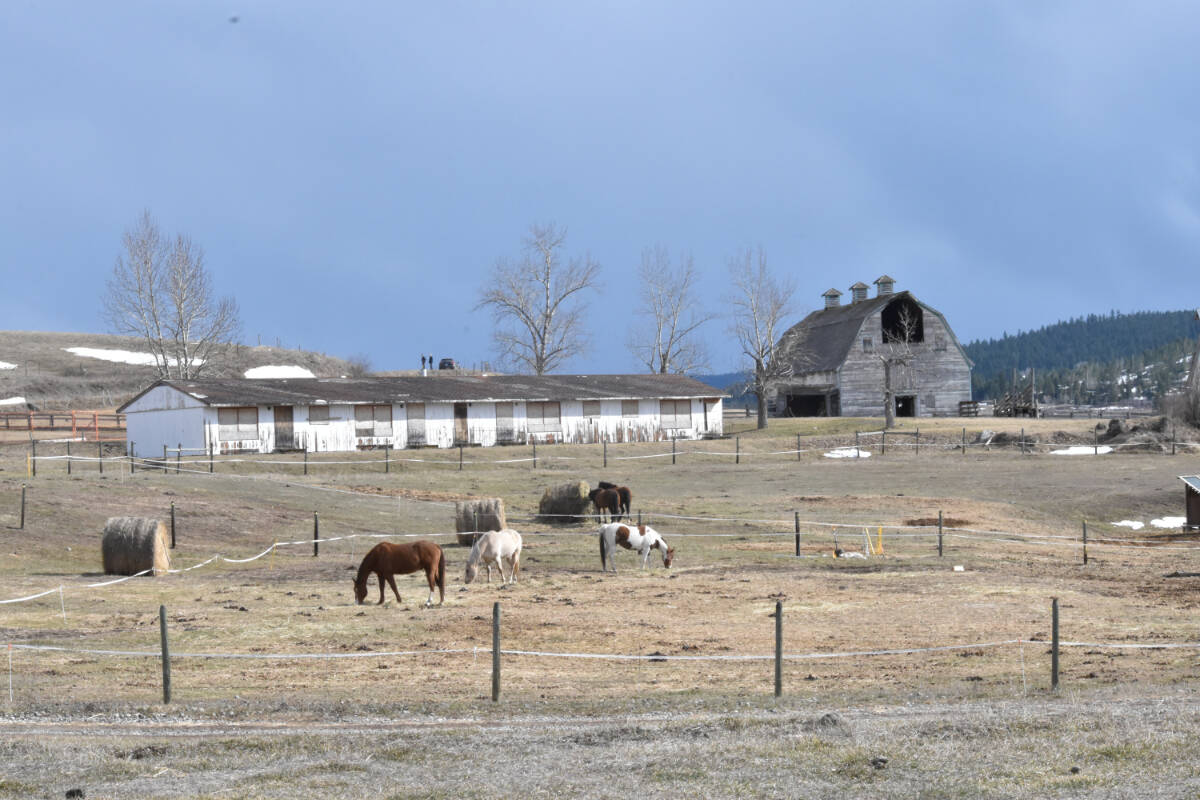Williams Lake First Nation (WLFN) has taken ownership of 13.7 acres of private property where the St. Joseph’s Mission Residential School operated between 1891 and 1981.
WLFN Kukpi7 (Chief) Willie Sellars and Murray Rankin, Minister of Indigenous Relations and Reconciliation, made the announcement Tuesday morning, Sept. 5, just a few kilometres away from the site, at WLFN offices along Highway 97 near Williams Lake.
The $1.2 million purchase was made possible with $849,000 in funding from the Province of British Columbia and WLFN covering the remainder.
“It has long been the goal of WLFN’s current and previous councils to see this property preserved and protected,” said Kukpi7 (Chief) Willie Sellars.
In 2021, WLFN launched an investigation of the site to locate undocumented and unmarked burials associated with the residential school.
Since then there has been geophysical research and ground penetrating radar done at the site as well as archival research and survivor interviews.
As he thanked the owners for selling the property to WLFN, Sellars said, “it gives us peace of mind knowing we can move forward doing the investigation of the site.”
He said the investigative team continues to go through the findings to determine next steps.
“We eventually want to get to a position where we are exhuming and excavating but there is a process that we have to follow by holding up not only the Williams Lake First Nation but every other single First Nation that is impacted – holding up their ceremonies and their culture and their students that also went to that school.”
The team is looking at how to honour every single student who attended St. Joseph’s, he added.
In response to the announcement, Tsilhqot’in National Government Tribal Chair and Chief Joe Alphonse said residential schools in Canada are a special interest zone for all First Nations and he was angered by the fact the province aided in the WLFN purchase of St. Joseph’s Mission.
“For them to go ahead and give this to WLFN, they are just contributing to the trauma of First Nations through (more) interference,” Alphonse said.
“I can’t believe a politician would actually consider this to be a good idea … this ranks right up there with Sir John A. MacDonald’s idea to create these schools in the first place.”
Alphonse said 90 per cent of all the problems facing First Nations now have stemmed from residential schools and all nations should be part of the future of these residential lands.
Now that WLFN owns the property, Sellars said the priorities will be to preserve it, make it safe, and make it an area where people feel comfortable going and having ceremonies.
“The healing components of that site and what it means to Indigenous peoples that went to that school is very significant.”
Preserving the site will help with education and reconciliation, he said.
“We need to continue to keep these conversations into the main stream so they get more comfortable with having them and so people can heal.”
It is rare for a former residential school site to be on private land, Rankin said.
“This was quite a unique opportunity to acquire it and I want to say once again how grateful we are to the family for making it available,” he said.
“Williams Lake First Nation has agreed to be a caretaker, not just for this nation, but for all the others who want to come and reflect and commemorate as they see fit.”
As the owner of this property, WLFN can work with former students, families and communities on a long-term vision and plan to protect and commemorate the site of the former St. Joseph’s Mission. While planning is still in the early stages, this may include opportunities to re-imagine the site as a place for reflection, remembrance, truth telling and public education.
“Residential school survivors and their families have told us that the sites of former schools are of great significance and must be protected,” said Rankin. “The return of these lands will support the process of truth telling, healing and remembrance as it will ensure future generations know the true history of this site and its impact on the generations of children who were forced to come here.”
St. Joseph’s Mission was administered by the Roman Catholic Church through much of its history under the Oblates of Mary Immaculate and the Sisters of the Instruction of the Child Jesus.
Indigenous children from more than 40 communities were taken to St. Joseph’s Mission, including children from Tŝilhqot’in, Secwépemc, Dakelh, and Stl’atl’imx First Nations.
WLFN has released its preliminary findings of 159 reflections that indicate potential human burials or remains.
In the 1980s and 1990s, there were three high-profile criminal convictions for physical and sexual assault that took place at St. Joseph’s Mission.
A National Indian Residential School Crisis Line has been set up to provide support for former residential school students and others affected. Access emotional and crisis referral services by calling the 24-hour national crisis line at 1 866 925-4419.
The KUU-US Crisis Line Society:
* Crisis services for Indigenous Peoples in B.C. are available 24 hours a day, seven days a week, toll-free throughout the Province, at 1 800 588-8717.
* Alternatively, individuals can call direct into the Adult/Elders Line at 250 723-4050 or the Children/Youth Line at 250 723-2040.
* More information: https://www.kuu-uscrisisline.com/
Métis Crisis Line:
* A service provided by Métis Nation British Columbia.
* Available 24 hours a day, seven days a week, toll-free across the province at 1 833 638-4722.
For WLFN-specific resources, visit: https://www.wlfn.ca/wp-content/uploads/2023/01/WLFN-Emergency-Emotional-Spiritual-Health-Resources-Jan.-2023.pdf
READ MORE: Williams Lake First Nation marks Truth and Reconciliation Day with prayers, drumming
Don’t miss out on reading the latest local, provincial and national news offered at the Williams Lake Tribune. Sign up for our free newsletter here.
Truth and ReconciliationWilliams Lake

